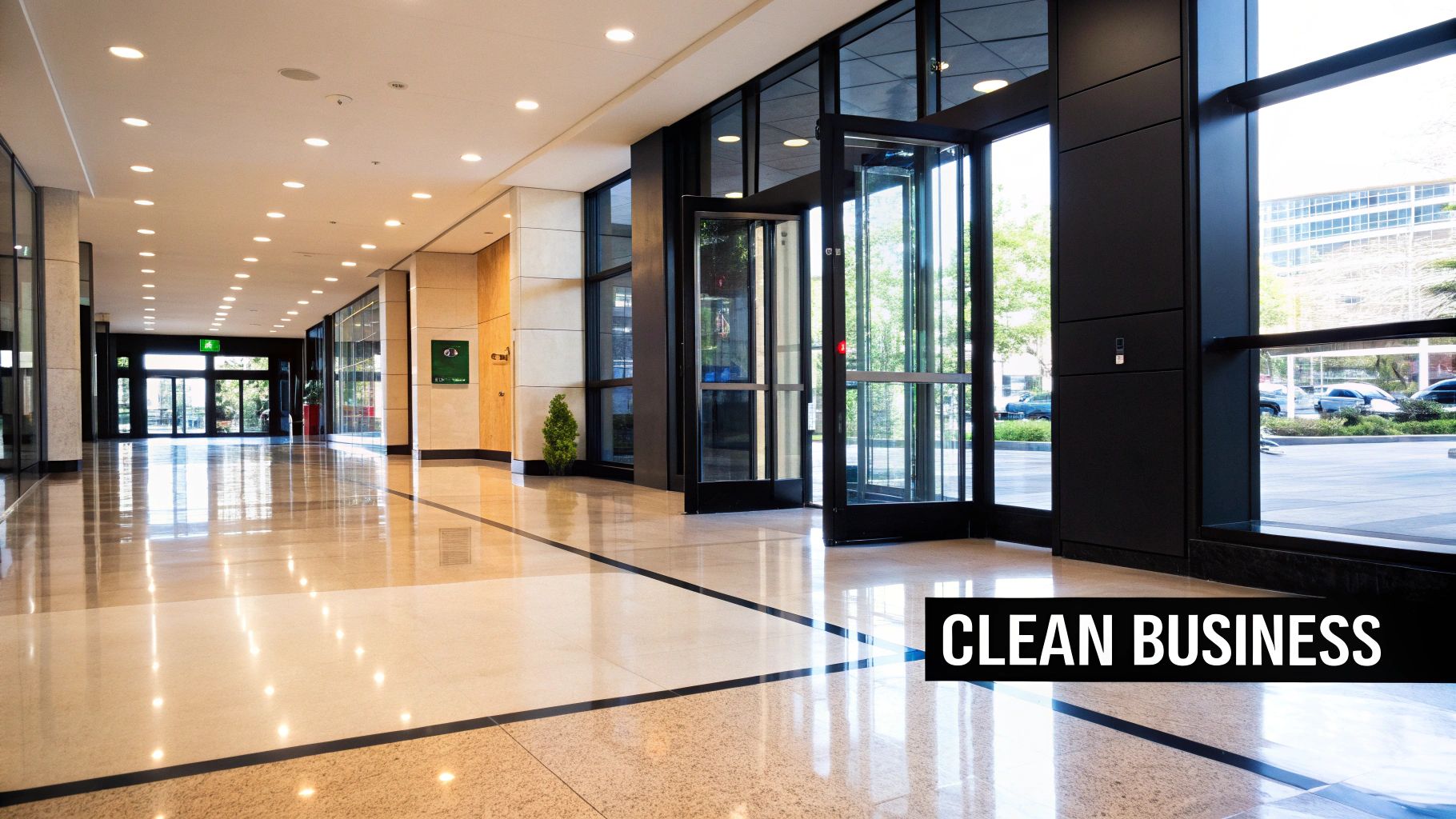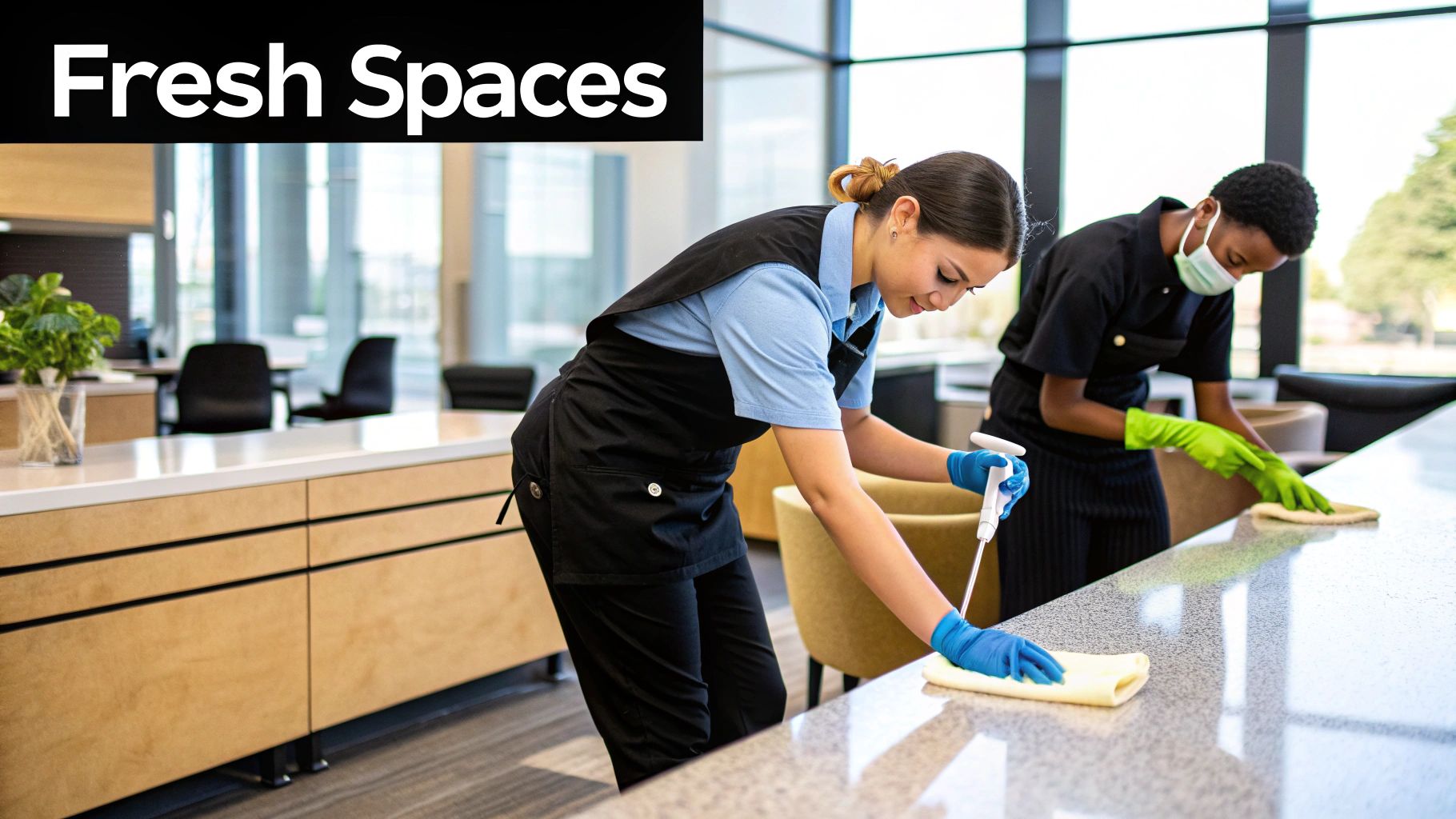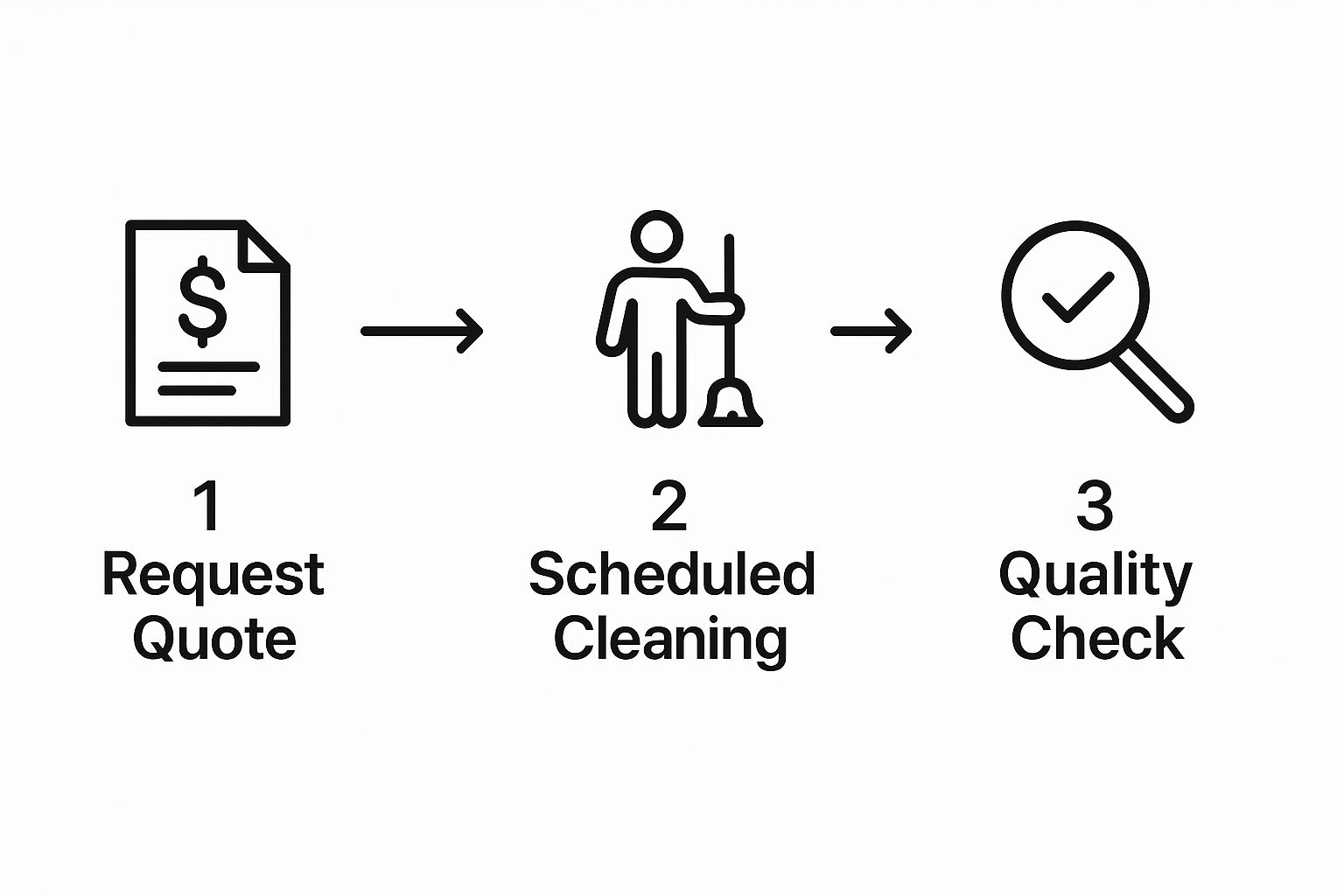Before you even think about searching for a "business cleaning service near me," you need to do a little homework. Taking a moment to clearly define what your business actually needs is the single most important thing you can do. It's the key to getting accurate quotes and finding a real long-term partner, not just another vendor who misses the mark.
Pinpointing Your Exact Cleaning Needs

The difference between a cleaning job that's just "okay" and one that's truly exceptional is all in the details. Just asking for "office cleaning" is way too vague and leaves everything open to interpretation. Creating a detailed scope of work is how you prevent misunderstandings and set clear expectations right from the start.
Think of it like building a house. You wouldn't just tell a contractor to "build me a house" without giving them a full set of blueprints. Your cleaning scope is that blueprint for a consistently clean and healthy workspace.
Map Out Your Physical Space
First things first, grab a notepad or your tablet and walk through your entire facility. Your mission is to create a complete list of every single area that needs cleaning. It really helps to break them down by how much they're used.
- High-Traffic Zones: These are the spots that see constant action and need daily love. We're talking about the main reception area, employee restrooms, hallways, and the kitchen or breakroom.
- Moderate-Traffic Zones: These spaces get used regularly but might not need the same intense daily scrub. Think individual offices, cubicle areas, and conference rooms.
- Low-Traffic Areas: What about those storage closets, server rooms, or meeting spaces that only get used once in a while? These might only need a touch-up once a week or even every other week.
This simple mapping exercise gives you instant clarity on the workload. A busy real estate office with clients constantly walking through the lobby has completely different needs than a quiet software company where most of the foot traffic is internal. While the goal is always cleanliness, knowing your specific environment is everything. If you want to dive deeper into what a professional cleaning checklist looks like, checking out a guide on what a cleaning service includes can give you great insight into industry standards.
Determine Your Cleaning Frequency
Once you've got your map, the next logical step is figuring out how often these areas need attention. This decision directly shapes your monthly cost and the overall condition of your facility.
Here's what to consider:
- Team Size: An office with 50 employees is going to create a lot more daily mess than an office with 10.
- Client & Visitor Traffic: Are you hosting clients every day? A flawless first impression is absolutely non-negotiable.
- Type of Business: A medical clinic has strict daily disinfection requirements, whereas a typical office might just focus on general tidiness.
Pro Tip: Don't automatically assume you need a standard five-day-a-week service. Many small businesses do great with a Monday-Wednesday-Friday schedule. It keeps the space fresh for the week while being much more cost-effective.
Identify Your Non-Negotiables
Finally, make a list of your absolute deal-breakers. Being crystal clear about these must-haves from the get-go will save you a ton of time when you're vetting potential companies.
Your list of non-negotiables might include things like:
- After-Hours Service: The cleaning crew absolutely must work outside your business hours (e.g., after 6 PM).
- Eco-Friendly Products: You're committed to using green or non-toxic cleaning supplies.
- Specific Protocols: You require certain disinfection procedures, especially in restrooms and kitchens.
- Insurance & Bonding: Confirmation that the service is fully insured and bonded is a must-have for your peace of mind.
How to Find Reputable Local Cleaning Companies

Now that you have a detailed cleaning plan, it's time to find the right people for the job. You could just type "business cleaning service near me" into Google, but the best partners are often found through good old-fashioned word-of-mouth. Your goal isn't to get a huge list, but a solid shortlist of 3-5 highly-regarded providers in your area.
I always tell clients to start by tapping into their professional network. A referral from a trusted source is worth its weight in gold because it comes with a built-in layer of trust.
- Your Local Chamber of Commerce: These organizations are hubs for vetted local businesses and can be a goldmine for reliable recommendations.
- Professional Groups on LinkedIn: Don't be shy about asking for suggestions in industry-specific groups. A property manager in a local real estate group, for instance, will have direct experience with commercial cleaners and can offer honest feedback.
- Neighboring Businesses: Just walk next door. If a nearby business has a consistently clean storefront, ask the manager who they use. It’s a simple, direct way to find a proven service.
Evaluating Their Digital Presence
Once you have a few names, it's time for a quick digital background check. Think of a company’s website as its digital storefront—it tells you a lot about their professionalism. A sparse, outdated site is usually a red flag.
Look for a website that’s clean, professional, and easy to get around. You should be able to find clear descriptions of their commercial services. To get a good feel for what a top-tier service menu looks like, check out our guide on professional office cleaning solutions. It gives you a great baseline for what to expect.
Key Insight: The best cleaning companies are proud of what they do. I always look for case studies, photo galleries of their work, or testimonials from other local businesses. This kind of proof shows real experience and a commitment to quality that speaks louder than any marketing fluff.
Interpreting Online Reviews
Finally, head over to review sites like Google and Yelp, but read them with a discerning eye. The star rating is just one piece of the puzzle; the real story is in the patterns.
- Look for recency and consistency. Are the positive reviews recent and coming in regularly?
- Pay attention to the details. Reviews that mention specifics—like "they never forget to sanitize the doorknobs" or "the team is incredibly responsive"—carry more weight.
- Analyze the negative reviews. One bad review isn't a dealbreaker. What really matters is how the company responded. A professional and helpful reply shows they care about their clients and are willing to make things right.
The Vetting Process: What to Ask and Verify
You’ve got your shortlist of potential cleaning partners. Now for the real work. It’s time to move beyond their website and online reviews and start asking the tough questions. This is how you separate the true professionals from the risky hires when you're searching for a "business cleaning service near me."
Going into these conversations armed with the right questions is everything. Your goal isn’t just to learn what they clean, but how they operate behind the scenes. This is about hiring a team you can trust to be in your office after everyone else has gone home.
This helpful infographic breaks down the typical journey a client takes, from that first call to ongoing quality checks.

As you can see, a professional service doesn’t stop when the cleaning is done. It includes that crucial quality check to make sure the standards you agreed on are met, every single time.
Verifying Insurance and Credentials
First things first: insurance. This is an absolute deal-breaker. An uninsured or underinsured cleaner is a huge liability just waiting to happen. If an accident occurs on your property, you could be the one paying for it.
You need to ask for proof of two key types of coverage:
- General Liability Insurance: This is what protects your property. If a cleaner accidentally breaks expensive equipment or causes a water leak that damages your floors, this insurance covers the repair or replacement costs.
- Workers' Compensation: This protects their employees—and you. If a cleaner gets injured while working in your facility, this covers their medical bills and lost wages. Without it, you could be held liable.
Don't just take their word for it. Insist on seeing a Certificate of Insurance (COI). Any legitimate company will provide this immediately. Check that the policy is current and the coverage limits are high enough to protect your business's assets.
Understanding Employee Screening and Training
You need to know exactly who will have access to your building after hours. It’s a matter of trust and security. Don't be shy about asking direct questions about their hiring process.
For instance, do they perform thorough background checks on every single employee? This is a standard, non-negotiable practice for any reputable firm.
Next, ask about their training programs. A well-trained team is far less likely to cause accidental damage or miss important cleaning details. Ask questions like, "What kind of initial and ongoing training do your cleaners receive?" and "Are they trained on the safe handling of cleaning chemicals and how to use specialized equipment?"
A company that invests in its people is a company that invests in quality. Proper training on safety protocols, chemical handling, and cleaning techniques for different surfaces is a clear sign of professionalism.
The global cleaning services industry is enormous, projected to hit $468.2 billion by 2025. While commercial cleaning is the largest part of that market, it's dominated by small businesses—over 90% employ fewer than ten people. This means you have plenty of choices, but quality can vary dramatically. You can explore more cleaning industry statistics to understand just how crucial your vetting process is.
To make sure you don't miss anything critical during your interviews, use this checklist.
Essential Vetting Checklist for Cleaning Services
| Verification Area | What to Ask/Check | Why It Matters |
|---|---|---|
| Insurance | Can I see your Certificate of Insurance (COI)? What are your liability limits? | Protects your business from financial liability in case of accidents or damage. |
| Background Checks | Do you conduct background checks on all employees? | Ensures trustworthy and vetted individuals have access to your secure facility. |
| Employee Training | What training do your cleaners receive on safety and cleaning protocols? | A well-trained team delivers better results and reduces the risk of property damage. |
| Quality Control | How do you ensure consistent quality? Do you have supervisors or inspections? | A clear process for quality assurance means they are accountable for their work. |
| Complaint Resolution | What is your process for handling a complaint or a missed item? | Shows their commitment to customer satisfaction and fixing mistakes quickly. |
| References | Can you provide references from businesses similar to mine? | Hearing from current clients gives you real-world insight into their reliability. |
Having these questions ready helps you compare companies on an even playing field and make a decision based on facts, not just a sales pitch.
Inquiring About Quality Control
Consistency is the mark of a truly great business cleaning service. How does a potential company guarantee you'll get the same high-quality service every time? It all comes down to their quality control systems.
Ask them to walk you through their process for maintaining standards.
- Do they have on-site supervisors who oversee the work?
- Are there regular inspections performed by a manager?
- What happens if you have an issue or complaint? What's their resolution process?
A company with a clear, proactive quality control plan is one that's built for consistency. It shows they’re committed to accountability and your satisfaction, not just checking boxes and heading out the door.
Decoding Quotes to Find the Best Value
Getting a few quotes from local companies is the easy part. The real challenge is looking past the bottom-line number and truly understanding what you’re getting. A cheap price on paper can quickly become expensive if it means surprise costs, shoddy work, or dealing with an uninsured crew.
When you're comparing proposals, you'll run into a few different pricing models. Knowing how they work is the first step to making a smart financial decision for your business.
Common Pricing Models Explained
The way a company structures its pricing tells you a lot about its approach. Here are the most common formats you’ll see:
- Flat Monthly Fee: This is the most predictable option. You pay one set price each month for a clearly defined list of services. It’s perfect for budgeting and ideal for businesses that need consistent, recurring cleaning.
- Hourly Rate: Some companies charge by the hour, per cleaner. This can be cost-effective for a one-off deep clean or if your needs change often, but it makes long-term budgeting a bit of a guessing game.
- Price Per Square Foot: You’ll see this a lot with larger commercial spaces. The company calculates a rate based on your facility's size. It’s straightforward, but you absolutely need a detailed scope of work to make sure it’s accurate.
Understanding these pricing structures is crucial. You can dig deeper into how these costs are calculated in our guide on general cleaning prices.
Look Beyond the Price Tag
Let’s be honest: the cheapest quote is almost never the best value. A price that seems too good to be true usually is, and it can be a massive red flag. An unusually low bid might mean the company is cutting corners—maybe they use untrained staff, don’t carry proper insurance, or just skip essential tasks.
Insider Tip: Always compare quotes side-by-side. I recommend creating a simple spreadsheet. List each company and exactly what’s included in their proposal. Does it cover cleaning supplies and equipment? Are specialized tasks like window washing or carpet deep-cleaning extra? This direct comparison will quickly show you who offers the most for your money.
Demand for professional cleaning is huge, contributing to a global market valued at around $182 billion. With so many providers out there, your vetting process is more important than ever to find a quality partner. You can learn more about the growth of the commercial cleaning market and see why professional standards are non-negotiable.
When you review each quote, confirm what’s actually covered. A slightly higher price from a company that includes all supplies, uses high-quality equipment, and has a documented quality control process often provides far better long-term value. It saves you from unexpected add-on fees and the headaches that come with inconsistent service. The goal is to find a reliable partner who delivers solid, high-quality results that fit your budget—without any unwelcome surprises.
Finalizing the Hire and Onboarding Your New Partner

You’ve done the hard work—the research, the walkthroughs, the quote comparisons—and you've picked the perfect cleaning partner for your business. It's a big relief, but don't pop the champagne just yet. The final steps are all about locking in the details and making sure your new partnership starts off on the right foot.
While a handshake feels good, a detailed contract is what truly protects your business. This formal document, often called a Service-Level Agreement (SLA), is your playbook. It lays out every single expectation in black and white, preventing those frustrating "I thought that was included" conversations down the road.
Your Essential Contract Checklist
Before you put pen to paper, review the agreement with a fine-tooth comb. This isn't just about legal jargon; it's the very foundation of a solid working relationship. Any truly professional company will be more than happy to provide a clear, comprehensive contract.
A solid agreement should always specify:
- A Detailed Task List: A complete, room-by-room checklist of all cleaning duties. No gray areas, no assumptions.
- The Cleaning Schedule: The exact days and times the crew will be on-site.
- Communication Protocols: How will you report issues, ask for extra services, or give feedback? Get the process in writing.
- Issue Resolution Plan: What happens if a cleaning is missed or doesn't meet the standard? The contract should outline the company’s steps to make it right.
- Term and Cancellation Policy: The length of the agreement and the rules for parting ways if things don't work out.
A strong contract is a sign of a professional business cleaning service. If a company is hesitant to put their promises in writing, consider it a major red flag. Clarity and transparency are non-negotiable for a long-term partnership.
The commercial cleaning services market is booming. North America alone holds a 37.65% share of a global market valued at roughly $415.93 billion. All this growth gives you more options, but it also makes it critical to choose a partner who operates professionally. You can dive deeper into cleaning service market trends to see how top-tier companies are setting themselves apart with things like iron-clad contracts.
Creating a Seamless Onboarding Experience
Contract signed? Great. Now it's time for onboarding. A fantastic start paves the way for a smooth, drama-free relationship. Don’t just hand over the keys and cross your fingers. A little prep now will save you a ton of frustration later.
A smooth onboarding ensures the new team can hit the ground running efficiently and securely from day one.
Your Practical Onboarding Plan
- Introduce the Key People: Designate a single point of contact at your company for all cleaning-related matters. Make sure they meet the cleaning company’s manager or supervisor.
- Clarify Access and Security: Walk the crew supervisor through your building. Clearly show them alarm procedures, which doors to use, and any areas that are off-limits. Hand over any necessary keys, fobs, or access codes.
- Review the Task List On-Site: This is a big one. Grab your copy of the task list and physically walk through the space with the cleaning supervisor. Point out specific priorities, like the high-traffic reception area or that breakroom sink that always gets messy. This visual confirmation gets everyone on the same page.
Taking just an hour to nail this onboarding can save you months of headaches. It builds clear communication channels and reinforces the expectations you both agreed to. It’s the final, crucial step to turn that "business cleaning service near me" search into a real success story.
Your Business Cleaning Service Questions Answered
Even after doing all your homework, you're bound to have a few questions left. When you're about to hire a business cleaning service near me, it's smart to clear up any final doubts. Getting these answers now ensures you’ll be happy with your choice for years to come.
Here are some straightforward answers to the questions we hear most often from business owners just like you.
What Is the Difference Between Commercial Cleaning and Janitorial Services?
Think of it like this: janitorial services are all about the day-to-day upkeep that keeps your space running smoothly. These are the recurring tasks like emptying trash cans, wiping down desks and counters, vacuuming the busy hallways, and making sure the restrooms are stocked and sanitized. These things usually happen daily or several times a week.
Commercial cleaning, on the other hand, covers the bigger, less frequent jobs that require more muscle and specialized equipment. We're talking about deep carpet cleaning, stripping and waxing floors, power washing the building's exterior, or doing a detailed top-to-bottom window washing. Many professional companies offer both, letting you build a complete cleaning plan that fits your needs.
Should the Cleaning Company Provide Its Own Supplies?
In most cases, yes. A professional cleaning service will almost always include the cost of their own commercial-grade supplies and equipment in their quote. This is a huge plus for you—it means they’re using effective, proven products and well-maintained gear, and you don’t have to worry about stocking a supply closet.
If your business has specific requirements—like a preference for green, eco-friendly products or a need for hypoallergenic solutions for sensitive employees—definitely bring this up during the quote process. A good company can easily accommodate these requests, though it might adjust the final price slightly.
Are Long-Term Contracts Standard for Cleaning Services?
This really varies from one company to the next. Many providers lean toward one-year contracts because it helps them lock in stable pricing and assign a consistent, dedicated team to your facility. But that’s certainly not your only option.
Some companies offer more flexible month-to-month agreements, which can be perfect if you’re trying out a new service. It's also pretty common to see a 30-day trial period. Don't be afraid to ask about the contract terms and negotiate something that makes you feel comfortable. A company that’s confident in its work is usually more willing to be flexible.
What Should I Do If I Am Not Happy with a Cleaning?
This is exactly why having a good contract and clear communication channels is so important. The very first step is to contact your point person at the cleaning company right away. Don’t let it slide.
Be specific and constructive with your feedback. For instance, instead of just saying "the office was still dirty," try "the conference room table wasn't wiped down, and the trash in the breakroom was missed." If you can, a quick photo from your phone is incredibly helpful to show exactly what was overlooked. Any reputable company wants to make it right and will value the clear feedback. Your service agreement should spell out their process for fixing issues, which almost always includes sending a team back to re-clean the missed areas at no extra cost.
Ready to partner with a trusted, professional cleaning service that has proudly served Mid-Michigan since 1982? Let Custom Maids create a pristine environment for your employees and clients. Contact us today for a free, no-obligation consultation!

